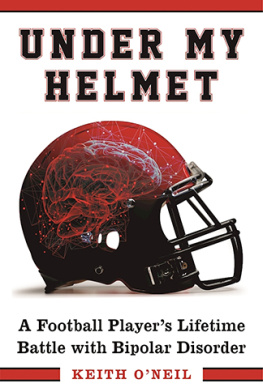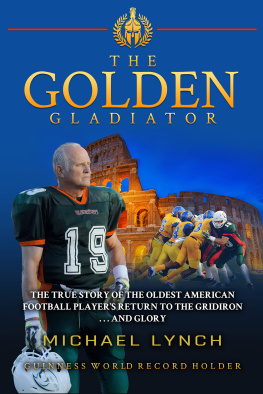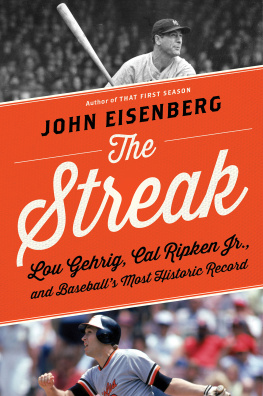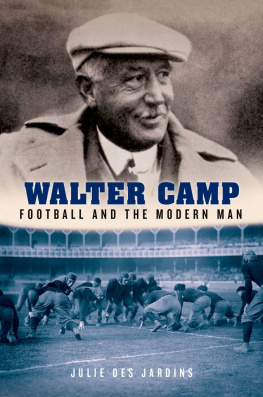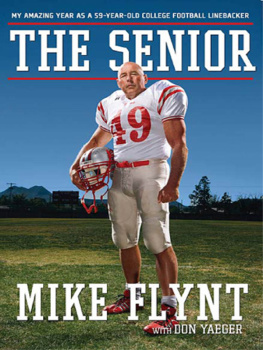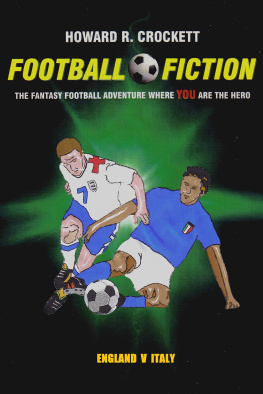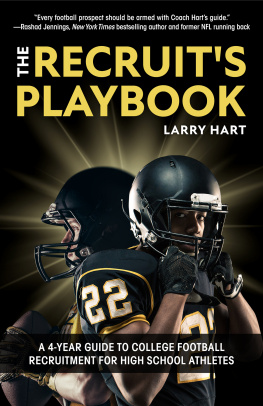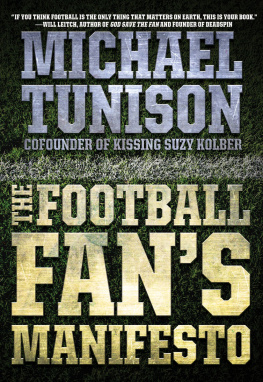Copyright 2017 by Keith ONeil
Foreword copyright 2017 by Tony Dungy
All rights reserved. No part of this book may be reproduced in any manner without the express written consent of the publisher, except in the case of brief excerpts in critical reviews or articles. All inquiries should be addressed to Skyhorse Publishing, 307 West 36th Street, 11th Floor, New York, NY 10018.
Skyhorse Publishing books may be purchased in bulk at special discounts for sales promotion, corporate gifts, fund-raising, or educational purposes. Special editions can also be created to specifications. For details, contact the Special Sales Department, Skyhorse Publishing, 307 West 36th Street, 11th Floor, New York, NY 10018 or .
Skyhorse and Skyhorse Publishing are registered trademarks of Skyhorse Publishing, Inc., a Delaware corporation.
Visit our website at www.skyhorsepublishing.com.
10 9 8 7 6 5 4 3 2 1
Library of Congress Cataloging-in-Publication Data is available on file.
Cover design by Tom Lau
Cover image: iStockphoto
Print ISBN: 978-1-5107-1686-5
Ebook ISBN: 978-1-5107-1688-9
Printed in the United States of America
For my beautiful wife Jill and sons Connor and Tanner,
and for all those living with a silent illness
TABLE OF CONTENTS
Authors Note
Under My Helmet is not about concussions or chronic traumatic encephalopathy (CTE). Those subjects are important and potentially tragic. They affect too many who play football, including in the NFL, as well as other athletes and those who participate in high-risk activities.
Under My Helmet is about a condition that affects far more people than that. You dont have to make a single tackle to be affected. Those close to us who are impactedand we each know many of them, some of whose conditions remain hidden from usare just regular people. They did not put themselves in harms way.
It happens that I played football. But this is not really about football.
Foreword by Tony Dungy
I first met Keith ONeil in September of 2005. I was the head coach of the Indianapolis Colts, and our scouting department told us he was a player who could help our team. Keith was a very good athlete who was tough, aggressive, and had a tremendous work ethic. In short, he was our kind of player. After doing a little research, there was another reason I was drawn to him. Keiths father, Ed ONeil, had been a player for my favorite team growing up, the Detroit Lions. I had watched Ed play, and I knew if Keith was anything like his dad, he would certainly be an asset to us. We had an opening at linebacker, his position, and we decided Keith would upgrade our football team.
When Keith arrived, he had the look of a young man who had everything you could ask for in life. He was joining a team that had an opportunity to win a Super Bowl. He was going to make a good sum of money playing the game he loved. He had a beautiful fiance, Jill, and his future seemed so bright. Once Keith got on the field, he picked up our defenses very quickly and fit right in with our group of players. After just one week of practice, we were very confident wed made a good decision. Keith was going to be an integral part of our team, and he was in our game plan as we were preparing to open up the regular season against the Baltimore Ravens.
As we were making final preparations to fly to Baltimore, Keith told me he needed to see me. I thought he may have wanted some clarification on the schedule or what we were expecting of him, and what his role might be going forward. That is what most new players want to know. But what Keith shared with me in my office caught me completely off guard. He said he was having difficulty adjusting to this new situation. He was having trouble sleeping because he was very anxious and didnt think he could make the trip with us to Baltimore. At first I thought he merely needed some encouragement, that he wasnt sure how well he was performing on the field. I told him he was doing exceptionally well and the coaches were very happy with how he was doing. He would be a big part of our special teams units while he continued to learn the nuances of our defense.
But as we talked a little more, I could see that it wasnt the uncertainty of how he was performing that was bothering Keith. It was what was going on in his life and, more specifically, what was going on in his mind. He was apprehensive about the whole situation. Moving from Dallas to Indianapolis, learning a new system, making new friends, finding a place to live, hoping his fiance could adjust to this new life, as well. It was all starting to overwhelm him, and he needed some time to sort it out. He asked me if it would be okay if he didnt travel with the team to Baltimore. He felt he needed to spend some time with Jill and work things out.
That was definitely a first for me. Normally, I was the one telling players that they wouldnt be making the trip, that they needed to keep working hard, and eventually their chance would come. But here was Keith, with the opportunity he had worked for his entire life, telling me he didnt think he was ready to play at the moment. The more we talked, I could see that there were deeper issues. I didnt know what was at the root of his problem, but I knew we had people on our support staff who could help.
We believed in Keith and wanted to help him. I told him not to worry about the Baltimore game that week. We were concerned about the big picture, the entire season and, more importantly, about his emotional health. We decided he would take the weekend and spend it with Jill, but we also wanted him to visit with our medical people and see if we could help him with this anxiety issue.
That was just the start, as Keith still had a great deal of personal anguish to confront.
I am delighted to tell you that this story has a happy ending. While Keith went on to play some outstanding football for us, and his contributions helped us the following year to beat the Chicago Bears in Super Bowl XLI, the more important development was that Keith was eventually diagnosed as having Bipolar disorder. Through the same grit he showed on the field, he was able to get much-needed help from so many caring people. He is now married and has two beautiful children but, more than that, has a feeling of control over his life.
Everyone in the National Football League has the goal of winning a Super Bowl. Keith has done that, and I know he is very proud of that accomplishment. But I believe that writing this book is even more significant than winning a Super Bowl. Since being diagnosed, Keith has made it his mission to help other people who are suffering from mental illnesses. He wants to let people know that there is no shame in having a mental illnessit is no different than a physical ailment. If you see the right doctors and follow the right treatment plan, you can improve, and even be healed.
Keith and I have stayed in touch over the years, and Im extremely proud of him. I always felt our job as NFL players and coaches was not just to win games, but to make our communities better places to live. Im just happy that Keith had the courage to come into my office that day and tell me something was wrong. That was the start of his recovery process, and I pray that there may be someone who reads this book and it starts them on their way to healing.
Thank you, Keith, for opening up your heart and your life to help others.
Tony Dungy
May 2017

